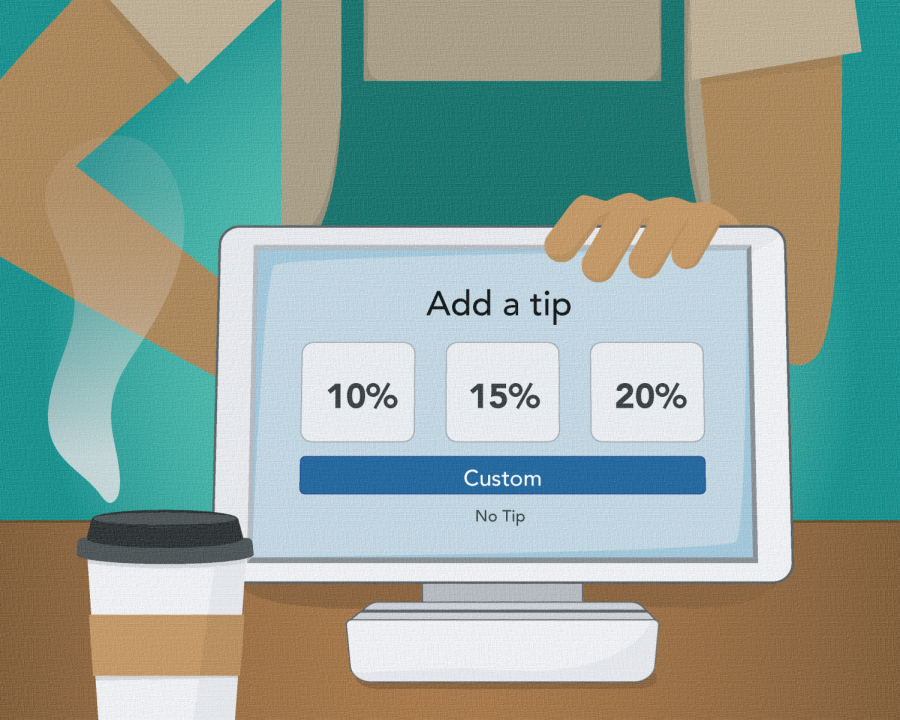Tipflation Made Worse by Touchscreen Tablets
If you have strolled into any coffee shop recently, chances are that you have encountered some form of a tipping option — most likely on a touchscreen. It is hard to press the “no tip” button when baristas or cashiers are staring you down, waiting to witness your choice. Although tipping is a beneficial practice meant to support employees living on meager salaries, tipping culture has gone too far. With touchless payment increasing in popularity and inflation on the rise, the line between when consumers should or shouldn’t tip has been blurred.
It seems like before the pandemic tipping was only customary at sit-down restaurants or when using a specific service, such as taxis or housekeeping. Now, it has become a much too normalized facet of the customer experience. In fact, when I walked into a convenience store last week to buy a water bottle, I selected the 20% tip button when the cashier prompted me to look at the screen without a second thought. At that moment, I realized that tipping was now an instinct for me, even when it shouldn’t be. While these tablets are helping make transactions faster at the counter, they are tricking customers like me into paying extra for services that in reality do not deserve any sort of tip.
Square, a financial services company known for creating the tablets we now see in businesses across the country, charges 2.6% plus 10 cents per transaction every time someone uses their card during an in-person transaction. Corporations are profiting more from this system than it may seem at first glance. Small businesses are having to pay these fees, which, in turn, has the potential to hurt employees.
I have always been a believer in tipping generously at restaurants, mostly because my parents instilled that value in me. Our backgrounds and the manner in which we were raised have the ability to affect our tipping instincts. For example, Amaury Llorens, FCRH ’26, believes that whether or not you should tip as a customer depends on the quality of the service or product.
“If the product you’re buying is cheap enough that the employer can’t afford to sell it at that price and also pay their servers, then it’s your responsibility to tip them for their service. However, if you are paying a premium for what you are getting [aside from sit-down restaurants], you should not always have to tip,” Llorens says.
Pertinent conversations around tiplation have also sparked a debate as to whether or not it is an employer’s duty to pay their workers living wages. Even if we disregard moral dilemmas, it still makes sense for employers to pay their employees higher wages. It should be clear that it is the employer’s responsibility to pay respectable wages because these wages boost workplace morale and efficiency and decrease the amount of employee turnovers, saving businesses money. That is certainly a win-win outcome in my book.
Beyond restaurants, I feel it should be up to the discretion of each consumer to decide whether or not a tip is necessary. Baristas, for instance, make at least minimum wage in most states, while most restaurant servers are paid a “server’s wage” which allows employers to combine cash wages and tip allowance to pay waiters.
The official federal minimum wage for servers and other tipped employees is only $2.13 per hour, a staggeringly low number even when tips are later added into the mix. This indicates that servers typically rely on tips more than baristas and other workers in the service industry. Despite this discretion, I still tip my baristas when I feel it is appropriate. I have never worked in a service job, so I try to put myself in their shoes and say, “I would probably appreciate that tip too.”
My general rule of thumb is to tip less when my order is simple and to tip more when the order is complicated or for a large group. When it comes to situations involving the infamous touchscreen tablets, however, I tend to tip more than I plan on because it is an inherently easy tactic to fall for, particularly with the added social pressure when you are face-to-face with a barista.
I will always continue to tip employees, especially when I believe the type and nature of service is worthy of a tip. Still, mediation is needed in order to put an end to these nonsensical tipping expectations and to debunk the greed of employers and larger companies.
Luis Roldan, GSB ’26, is undeclared from Winter Park, Fl.










































































































































































































